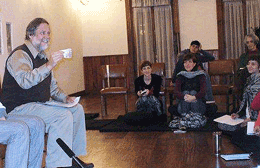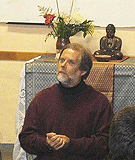Workshop:
Buddhism and the Ecological Challenge
The ecological crisis -- which includes global warming but is much bigger than that -- is the greatest challenge that humanity has ever faced. What does Buddhism offer, if anything, that can help us understand and respond appropriately? And what does the ecological crisis mean for how we understand and practice Buddhism (or follow any spiritual path) today?
Among other things, we will reflect together on the parallels between our perennial individual predicament (according to traditional Buddhism) and our collective predicament today in relation to the biosphere. What does all this imply about how we understand the bodhisattva path? What does it mean to be an "ecosattva"?
Workshop:
Transforming Self, Transforming World

What is the connection between personal and social transformation?
According to Buddhism, our usual sense of self is haunted by a sense of lack: "something is wrong with me." Why do we never have enough money, fame, sex? Because we try to fill up our sense of lack with them -- but it doesn't work.
Those obsessions also reveal where our society is stuck. The Buddha's “three poisons” have become institutionalized and taken on a life of their own: our economic system institutionalizes greed, racism and militarism institutionalize ill will, and the corporate media institutionalize delusion. And our collective sense of separation from the rest of the biosphere lies at the heart of the ecological crisis.
Any personal awakening we may experience remains incomplete without a “social awakening” to these institutionalized causes of suffering.
Image from workshop in Buenos Aires, 2010
Workshop:
The World is Made of Stories

Those who meditate are familiar with the warnings: “Don’t cling to concepts!” Yet concepts in themselves are fragments, meaningful as parts of stories. The problem is not stories themselves but how we relate to them. We do not see our stories as stories because we see through them: the world we experience as reality is constructed with them.
That the world is made of stories is consistent with what Buddhism says about the human predicament and how it can be resolved. The foundational story we tell and retell is the self, supposedly separate and substantial yet composed of the stories “I” identify with and attempt to live. Different stories have different consequences. Karma is not something the self has but what the sense of self becomes, when we play our roles within stories perceived as real. As those roles become habitual, mental tendencies congeal and we “bind ourselves without a rope.”
If the self is made of stories, what does that imply about its death? If the world is made of stories, what does that imply about its emptiness, what Buddhism calls shunyata? Do our stories obscure a craving for power that underlies and motivates what we do, or is power itself a screen-story for something else? If delusion is awareness stuck in attention-traps, and enlightenment liberates awareness, does the spiritual path involve finding the correct story, or getting rid of stories, or learning to story in a new way?
In addressing these and other issues, this workshop offers a new way of understanding Buddhism and a new Buddhist understanding of the Way.
